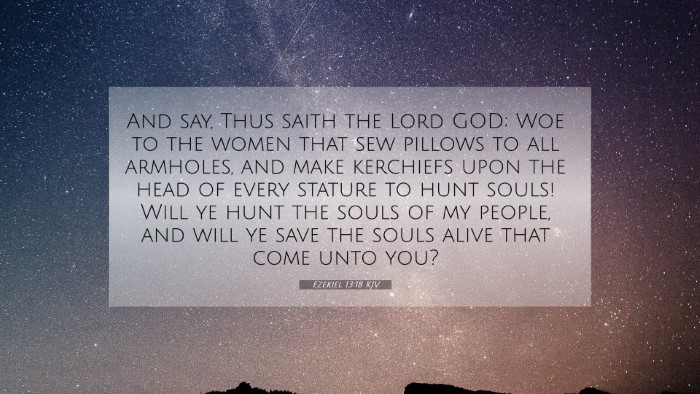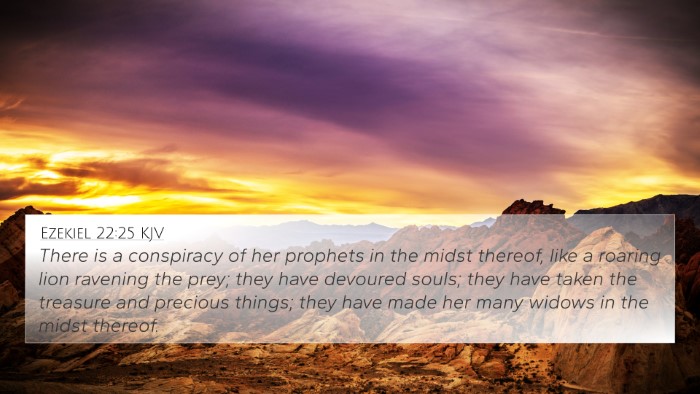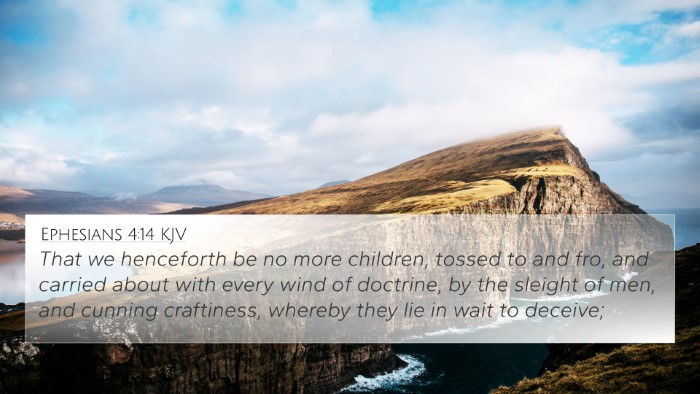Bible Verse Interpretation: Ezekiel 13:18
Ezekiel 13:18 states: "And say, Thus saith the Lord God; Woe to the women that sew pillows to all armholes, and make kerchiefs upon the head of every stature to hunt souls! Will ye hunt the souls of my people, and will ye save the souls alive that come unto you?" This verse addresses false prophets and symbolically criticizes the deceptive practices of those claiming to guide others, reinforcing the responsibilities of spiritual leaders and the grave consequences of leading others astray.
Summary of Insights from Public Domain Commentaries
-
Matthew Henry:
Henry emphasizes the seriousness of false prophecy and the destructive consequences it brings to the community. The verse conveys God's condemnation of those who exploit people's vulnerabilities for personal gain. The "pillows" represent comfort amidst false security, while the "kerchiefs" signify superficial protection that ultimately cannot save.
-
Albert Barnes:
Barnes highlights that the "hunting" metaphor implies a predatorial approach to spirituality where the women entice souls to false hopes. His commentary draws on the theme of personal accountability and how deceptive practices among leaders can lead the faithful astray, tapping into deeper themes of integrity within spiritual leadership.
-
Adam Clarke:
Clarke offers a nuanced understanding of the cultural context, stressing that the practices described were common among those practicing sorcery and divination. He notes the gravity of the situation, warning that God does not condone any actions that mislead His people or distract them from genuine faith.
Related Cross-References
This verse is interconnected with several other biblical texts that elaborate on the themes of false prophets and spiritual integrity:
- Jeremiah 14:14: God warns against the false prophets claiming to speak His words.
- 2 Peter 2:1: Describes the rise of false teachers among the people.
- Matthew 7:15: Encourages discernment against false prophets who come in sheep's clothing.
- Micah 3:5: Critiques prophets who lead people astray for monetary gain.
- Isaiah 9:16: States that those who guide the people have led them astray.
- Ezekiel 22:28: Speaks of false prophets who have not shown the people their iniquities.
- Romans 16:18: Warns about those who serve not our Lord Jesus Christ but their own belly.
Thematic Connections to Other Bible Verses
The themes of Ezekiel 13:18 resonate throughout Scripture, showcasing a consistent divine concern over falsehood and deceit:
- Proverbs 12:22: States that lying lips are an abomination to the Lord.
- John 10:12-13: Discusses the true shepherd versus the hireling who flees at the sign of danger.
- 1 John 4:1: Urges believers to test the spirits to see if they are from God.
Conclusion
Ezekiel 13:18 serves as a stark reminder about the importance of discernment in spiritual matters, urging believers to remain vigilant against false promises and deceptive teachings. The commentary insights reveal the gravity of the church's responsibility to shepherd its members faithfully. The thematic connections with other scriptural texts amplify the urgency of maintaining sound doctrine and spiritual integrity.
Tools for Bible Cross-Referencing
To study these connections effectively, utilize:
- Bible Concordance: To find specific verses and related topics.
- Bible Cross-Reference Guide: To identify corresponding themes across different books.
- Bible Chain References: To link scripture from various portions of the Bible.
- Cross-reference Bible Study Methods: To deepen understanding of theological principles through interconnected scriptures.
Further Study
For anyone wishing to conduct a comprehensive exploration of Ezekiel 13:18 and similar verses, employing cross-reference tools and engaging in a detailed comparative analysis of biblical texts will yield a richer understanding of biblical themes and teachings.
Consider how each Biblical reference interacts with Ezekiel 13:18, offering enriched context and highlighting the interconnectedness of Scripture across both Old and New Testaments. This cross-referenced approach opens a dialogue on spiritual leadership and accountability that resonates through the ages.











